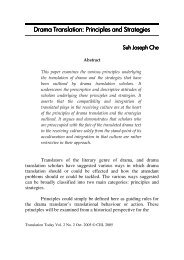Re-Evaluation of Lin Shu (the Chinese Translator) - National ...
Re-Evaluation of Lin Shu (the Chinese Translator) - National ...
Re-Evaluation of Lin Shu (the Chinese Translator) - National ...
Create successful ePaper yourself
Turn your PDF publications into a flip-book with our unique Google optimized e-Paper software.
Xu Jianzhong 151Obviously, more extra-linguistic or extra-literary factorsshould be taken into account in <strong>the</strong> study <strong>of</strong> <strong>Lin</strong> <strong>Shu</strong>’s translations.The majority <strong>of</strong> <strong>Lin</strong>’s versions came into being in early moderntimes, when China witnessed great changes. In <strong>the</strong> late QingDynasty (about 1890), foreign aggressions brought on serious socialcrisis in China. Some intellectuals began to realize <strong>the</strong> inferiority <strong>of</strong><strong>Chinese</strong> culture to Western civilization. As a means <strong>of</strong> importingWestern civilization so as to build up national strength translationbecame flourishing.Fur<strong>the</strong>rmore, traditional feudal ideology was not <strong>the</strong> onlydominant ideology in <strong>the</strong> early modern China. <strong>National</strong> salvationand reform became <strong>the</strong> central idea <strong>of</strong> <strong>the</strong> prevalent ideology.Meanwhile, <strong>Chinese</strong> literature could not keep pace with <strong>Chinese</strong>social development. Thus Capitalist <strong>Re</strong>formists launched “Literary<strong>Re</strong>volution”. To respond to <strong>the</strong> call <strong>of</strong> social development and“Literary <strong>Re</strong>volution”, translated fictions by <strong>Lin</strong> <strong>Shu</strong> came intoexistence.Evidently, <strong>the</strong> evaluation <strong>of</strong> <strong>Lin</strong> <strong>Shu</strong> and his translationscannot be interpretative, appropriate, objective and plausible withouttaking <strong>the</strong> status quo <strong>of</strong> China in <strong>the</strong> late Qing Dynasty intoconsideration. It gives a hand in uncovering <strong>the</strong> influence <strong>of</strong> socialculturalfactors on <strong>Lin</strong>’s translation. This <strong>the</strong>sis attempts to reevaluate<strong>Lin</strong> <strong>Shu</strong> and his translation from a cultural perspective.Through <strong>the</strong> examination <strong>of</strong> <strong>the</strong> influence <strong>of</strong> ideology, patronage aswell as poetics on <strong>Lin</strong>’s translation in particular, <strong>the</strong> article tries toelucidate what socio-cultural elements affected <strong>Lin</strong>’s translatedworks. In brief, <strong>the</strong> intention <strong>of</strong> <strong>the</strong> <strong>the</strong>sis is to provide ano<strong>the</strong>rperspective beyond linguistic level for <strong>the</strong> study and <strong>the</strong> evaluation<strong>of</strong> <strong>Lin</strong> <strong>Shu</strong> and his translation.In Lefevere’s concept, literary systems do not occur in avoid, but in <strong>the</strong> ideological milieu <strong>of</strong> an era (Gentzler, 2004: 136).This system is one <strong>of</strong> society, a constellation <strong>of</strong> systems. The literary
















